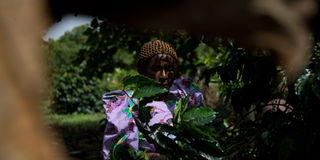Prime
Kyambura women brewing hope in a coffee cup

The women’s cooperative focuses on improving the quality of their coffee to gain recognition for their brand in the market. Photo by Rebecca Vassie.
What you need to know:
Though some of the women are living with HIV, this has not made them lose hope for a better life. A community-based initiative has given them the means of earning a livelihood from the coffee in their gardens.
Kyambura Gorge is a remarkable location in Western Uganda, set within the valleys of the Rwenzori mountain range at the edge of Queen Elizabeth National Park. Among the coffee trees and vegetable gardens in a small village, is a small coffee cooperative and processing station run by the Volcanoes Safaris Partnership Trust (VSPT), which is a non-profit organisation started by Volcanoes Safaris.
VSPT was created in 2009 and undertakes community and conservation projects in areas that neighbour Volcanoes Safaris lodges as a means of “giving back” to the local people.
Buffer zone
Kyambura Women’s Coffee Cooperative was started in 2010 to provide the women with a source of income through coffee growing, processing, sales and marketing.
Over 60 acres of land were purchased by The Trust at the edge of the national park to create a buffer zone between local farmers and park land in order to minimise human-wildlife conflicts in this densely human populated area.
They (VSPT) discovered over 1,500 coffee trees on this land, and as coffee is not eaten by most wildlife, decided to form the Kyambura Women’s Coffee Cooperative, allowing local women to harvest and process the VSPT coffee as their own. The Trust also built a processing station at their Community and Conservation Centre where the women come and process the coffee as well as hold tours for interested visitors and the tourists who come through Queen Elizabeth National Park.
Though there is a high production potential for Uganda’s coffee due to varying altitudes and fertile soils, which allow for two harvests a year for both Robusta and Arabica, according to Ms Nicole Simmons, the VSPT’s project manager, quality control is often lacking in processing methods, especially in rural areas. Kyambura Women’s Coffee Cooperative aims to change this buy focusing on quality control.
Interest in markets
So far it is a small operation, producing just over a tonne of coffee per year. However, the co-op is only in its second year, and this yield is expected to grow as the group hones their skills and marketing and sales increases. Their coffee, branded Omwani, is gaining a reputation for its quality and is receiving interest in local and international markets.
Comprising of 11 women and one man, the group works to maintain, harvest and hand process the coffee without the use of chemicals or pesticides.
Many of the women are widowed, struggling to raise their large extended families, and about a third of them live with HIV.
Ms Sikola Nakite, a 50-year-old grandmother of three and widow since the age of 25, explained that within the community, widows, both young and old, “behave as prostitutes”, entering into relationships with the men, who take advantage of their desperate situations. She says “Widows who go as prostitutes end up with nothing.”
Ms Annet Ashabe, who joined in early 2012, after her husband died of HIV, is struggling with the illness while raising four children. She explained how the work allows her independence and gives her the means to access necessary treatment and meet the needs.
There is no need for her to fear the unknown or search for a man to provide for her. “I am sick and a widow but I am strong and work hard and I earn a living,” she said.
Like a mother
The processes are traditional, keeping in touch with organic methods. The only machine used is a hand-operated one to peel and pulp the beans after picking.
But Simmons explained the processes will be modernised to gain capacity but also consistency with the final product. There are also plans to build a small café at Volcano Safaris, which will be largely run by the co-op and serve a variety of coffees and snacks to visitors, a prospect that excites all the members and allows the future of the women’s group to grow and prosper, creating more jobs for the local community and their families.
The women seem to enjoy their work and their time together, finding common ground within their own community. With the skills they have learnt, the Kyambura community will benefit as well as their income to raise their families out of poverty. Nakite, an original member of the group, compared VSPT to “a mother; it nurtures a child so that it can grow.”
Because of the high quality of the product, the VSPT pays the co-op 60 per cent more per kilo than they could fetch in the local market. The Trust then handles the marketing and sales of the coffee to recoup their cost. All proceeds from sales go back to the co-op and processing centre.
The Trust is also providing the group – most of whom cannot read or write – with financial management training with the aim that they will one day be able to manage all the marketing and sales autonomous of the Trust.




